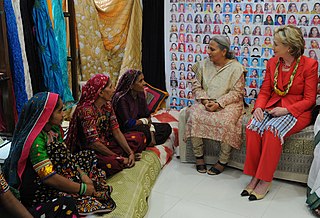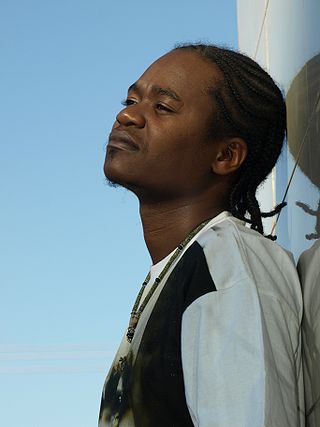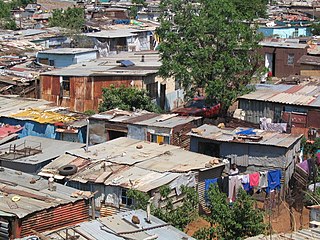Related Research Articles
A hierarchical organization or hierarchical organisation is an organizational structure where every entity in the organization, except one, is subordinate to a single other entity. This arrangement is a form of hierarchy. In an organization, this hierarchy usually consists of a singular/group of power at the top with subsequent levels of power beneath them. This is the dominant mode of organization among large organizations; most corporations, governments, criminal enterprises, and organized religions are hierarchical organizations with different levels of management power or authority. For example, the broad, top-level overview of the hierarchy of the Catholic Church consists of the Pope, then the Cardinals, then the Archbishops, and so on. Another example is the hierarchy between the four castes in the Hindu caste system, which arises from the religious belief "that each is derived from a different part of the creator God’s (Brahma) body, descending from the head downwards."

The economy of Kenya is market-based with a few state enterprises. Kenya has an emerging market and is an averagely industrialised nation ahead of its East African peers. Currently a lower middle income nation, Kenya plans to be a newly industrialised nation by 2030. The major industries driving the Kenyan economy include financial services, agriculture, real estate, manufacturing, logistics, tourism, retail and energy. As of 2020, Kenya had the third largest economy in Sub-Saharan Africa, behind Nigeria and South Africa. Regionally, Kenya has had a stronger and more stable economy compared to its neighboring countries within East Africa.By 2023, the country had become Africa's largest start-up hub by both funds invested and number of projects.

An informal economy is the part of any economy that is neither taxed nor monitored by any form of government. Although the informal sector makes up a significant portion of the economies in developing countries, it is sometimes stigmatized as troublesome and unmanageable. However, the informal sector provides critical economic opportunities for the poor and has been expanding rapidly since the 1960s. Integrating the informal economy into the formal sector is an important policy challenge.
Hand-waving is a pejorative label for attempting to be seen as effective – in word, reasoning, or deed – while actually doing nothing effective or substantial. It is often applied to debating techniques that involve fallacies, misdirection and the glossing over of details. It is also used academically to indicate unproven claims and skipped steps in proofs, with some specific meanings in particular fields, including literary criticism, speculative fiction, mathematics, logic, science and engineering.

Anthony Michael Bourdain was an American celebrity chef, author, and travel documentarian. He starred in programs focusing on the exploration of international culture, cuisine, and the human condition.
Rigour or rigor describes a condition of stiffness or strictness. These constraints may be environmentally imposed, such as "the rigours of famine"; logically imposed, such as mathematical proofs which must maintain consistent answers; or socially imposed, such as the process of defining ethics and law.
The Rostovian take-off model is one of the major historical models of economic growth. It was developed by W. W. Rostow. The model postulates that economic modernization occurs in five basic stages, of varying length.
- Traditional society
- Preconditions for take-off
- Take-off
- Drive to maturity
- Age of High mass consumption

Self-Employed Women's Association (SEWA), meaning "service" in several Indian languages, is a trade union based in Ahmedabad, India, that promotes the rights of low-income, independently employed female workers. Nearly 2 million workers are members of the Self-Employed Women’s Association across eight states in India. Self-employed women are defined as those who do not have a fixed employer-employee relationship and do not receive a fixed salary and social protection like that of formally-employed workers and therefore have a more precarious income and life. SEWA organises around the goal of full employment in which a woman secures work, income, food, and social security like health care, child care, insurance, pension and shelter. The principles behind accomplishing these goals are struggle and development, meaning negotiating with stakeholders and providing services, respectively.
In logic and philosophy, a formal fallacy, deductive fallacy, logical fallacy or non sequitur is a pattern of reasoning rendered invalid by a flaw in its logical structure that can neatly be expressed in a standard logic system, for example propositional logic. It is defined as a deductive argument that is invalid. The argument itself could have true premises, but still have a false conclusion. Thus, a formal fallacy is a fallacy in which deduction goes wrong, and is no longer a logical process. This may not affect the truth of the conclusion, since validity and truth are separate in formal logic.

Counter-economics is an economic theory and revolutionary method consisting of direct action carried out through the black market or the gray market. As a term, it was originally used by American libertarian activists and theorists Samuel Edward Konkin III and J. Neil Schulman. The former defined it as the study or practice "of all peaceful human action which is forbidden by the State".
Solidarity economy or Social and Solidarity Economy (SSE) refers to a wide range of economic activities that aim to prioritize social profitability instead of purely financial profits. A key feature that distinguishes solidarity economy entities from private and public enterprises is the participatory and democratic nature of governance in decision-making processes as one of the main principles of the SSE sector. Active participation of all people involved in decision-making procedures contributes to their empowerment as active political subjects. However, different SSE organizational structures reflect variations in democratic governance and inclusive participation. Ultimately, SSE represents a crucial tool in guaranteeing that social justice ideals are upheld and that the wellbeing of the most vulnerable populations is paid attention to during the planning processes.

Paul Julius Nunda, better known by his stage name Jua Cali, is a Kenyan rapper and record producer. In 2000, together with record producer Clemo, he founded Calif Records where he has been ever since, producing music which dominated East African music alongside Jose Chameleone of Uganda and Mr. Nice of Tanzania. Jua Cali performs in Swahili and Sheng in a popular Kenyan style of rapping called genge.
The following is a list of terms specific to anarchists. Anarchism is a political and social movement which advocates voluntary association in opposition to authoritarianism and hierarchy.

Martha Alter Chen is an American academic, scholar and social worker, who is presently a lecturer in public policy at the Harvard Kennedy School and senior advisor of the global research-policy-action network WIEGO and a member of the Advisory Board of the United Nations University World Institute for Development Economics Research (UNU-WIDER). Martha is a development practitioner and scholar who has worked with the working poor in India, South Asia, and around the world. Her areas of specialization are employment, poverty alleviation, informal economy, and gender. She lived in Bangladesh working with BRAC, one of the world's largest non-governmental organizations, and in India, as field representative of Oxfam America for India and Bangladesh for 15 years.
Zizhu chuangxin is a term frequently used in China by the Chinese government, academics, and businesses to describe the Chinese technology-led economic transformation in the past decades.
The informal economy of the People's Republic of China refers to a range of informal economic activity that stands outside of the recognized systems of regulations, taxation, and licenses. Although the term is sometimes understood to describe marginal, unregulated, and even criminal activity, there is considerable overlap between the informal sector and formal economy, and the informal economy serves an important societal function in contributing to employment and economic growth.
Statistics on unemployment in India had traditionally been collected, compiled and disseminated once every ten years by the Ministry of Labour and Employment (MLE), primarily from sample studies conducted by the National Sample Survey Office. Other than these 5-year sample studies, India had historically not collected monthly, quarterly or yearly nationwide employment and unemployment statistics on a routine basis. In 2016, the Centre for Monitoring Indian Economy, a non-governmental entity based in Mumbai, started sampling and publishing monthly unemployment in India statistics.

Informal housing or informal settlement can include any form of housing, shelter, or settlement which is illegal, falls outside of government control or regulation, or is not afforded protection by the state. As such, the informal housing industry is part of the informal sector.
Atmanirbhar Bharat, which translates to 'self-reliant India', is a phrase the Prime Minister of India Narendra Modi and his government used and popularised in relation to the country's economic development plans. The phrase is an umbrella concept for the Modi government's plans for India to play a larger role in the world economy, and for it to become more efficient, competitive and resilient.

Kenneth James King is since September 2005 Professor Emeritus of International and Comparative Education at the University of Edinburgh. He is a historian, an Africanist and former Director of the Centre of African Studies (CAS) at Edinburgh. King obtained a Bachelor of Arts Classical Tripos from the University of Cambridge, and a Postgraduate Certificate in Education at the Institute of Education, London. He taught African History at a secondary school in Addis Abeba, Ethiopia, and earned a PhD degree in African history at the University of Edinburgh in 1968. He then worked at the University of Nairobi before returning to Edinburgh, where he was a Lecturer, Reader and Professor. In 1978 he was seconded for four years to the International Development Research Centre (IDRC) in Ottawa, Canada. Kenneth King and his wife Pravina King Khilnani were both presented with the 2011/2012 Distinguished Africanist Award of the African Studies Association of the United Kingdom (ASAUK). King has researched the small scale informal sector enterprises in Kenya over a 20-year period, and more recently studied India-Africa cooperation in human resource development, especially in Kenya, Ethiopia and South Africa, and China's aid policies towards Africa.
References
- ↑ Bourdain, Anthony (2006). The Nasty Bits: Collected Varietal Cuts, Usable Trim, Scraps, and Bones. New York: Bloomsbury. ISBN 1-58234-451-5.
- ↑ Freeling, Nicolas (1970). The Kitchen. Hamish Hamilton, Ltd. ASIN B0006D075O.
- ↑ "Système D (Définition)".
- ↑ "débrouillard". Webster's New World College Dictionary. 2009. Retrieved 2009-05-24.
- ↑ "démerder | translate French to English". Cambridge Dictionary.
- ↑ Orwell, George (1933). Down and Out in Paris and London . London: Victor Gollancz. ISBN 0-15-626224-X.
- ↑ Neuwirth, Robert (2011). Stealth of Nations:the Global Rise of the Informal Economy. New York: Pantheon. ISBN 978-0-375-42489-2.
- ↑ Capps, Robert (2011-12-16). "Why Black Market Entrepreneurs Matter to the World Economy". Wired. Retrieved 2012-03-26.
- ↑ Neuwirth, Robert (2011-10-28). "The Shadow Superpower". Foreign Policy. Retrieved 2012-03-26.
- ↑ Clement, Christine. "The formal-informal economy dualism in a retrospective of economic thought since the 1940s" (PDF).
- ↑ Godfrey. "What is Economic Self-Reliance?".
- ↑ "Saying – South Africa | USC Digital Folklore Archives". 29 January 2011.
- ↑ Philip, Kavita; Irani, Lilly; Dourish, Paul (January 2012). "Postcolonial Computing: A Tactical Survey". Science, Technology, & Human Values. 37 (1): 3–29. doi:10.1177/0162243910389594. S2CID 856332.
- ↑ Wiens, Mark (2011-07-24). "Jua Kali – The Informal Kenyan Sector for "Git Er Done"". Migrationology. Retrieved 2018-06-16.
- ↑ "DISKARTE". Tagalog Lang. Retrieved 30 August 2020.